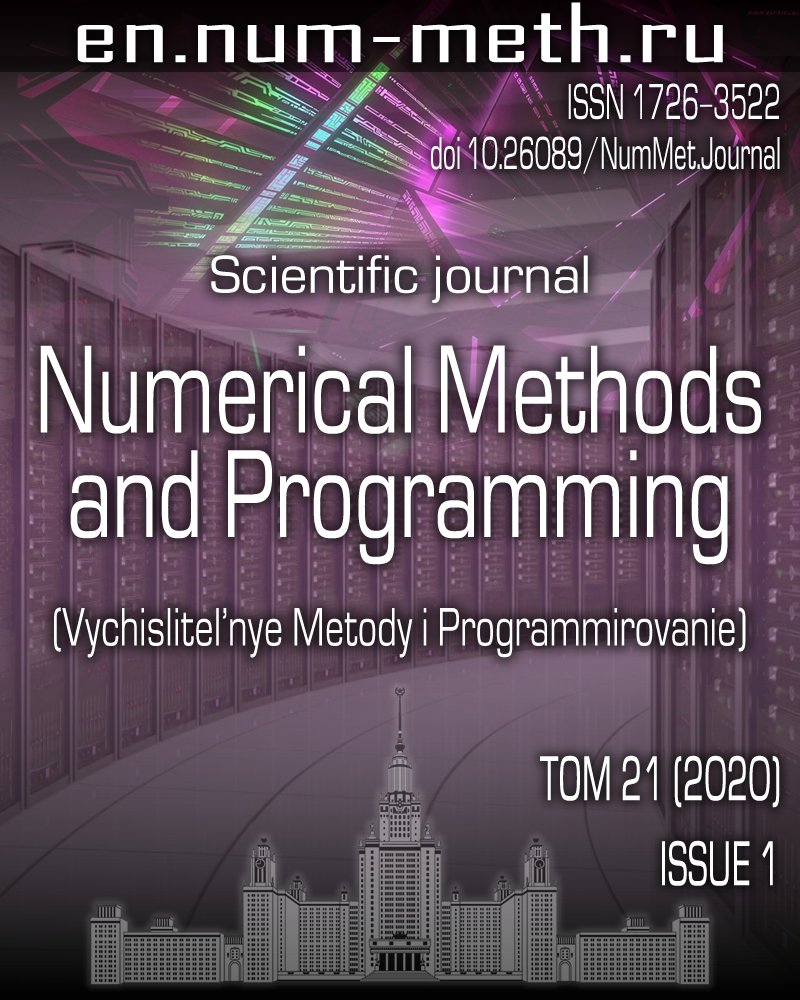DOI: https://doi.org/10.26089/NumMet.v21r105
An inverse problem of synthesis of nanooptical security elements for visual and automated authenticity verification
Keywords:
Abstract
This paper is concerned with solving inverse problems of the synthesis of nanooptical security elements. The synthesis of a nanooptical element involves calculating its phase function via solving an inverse problem and fabricating the microrelief with high precision. The microrelief of the nanooptical element illuminated at any point with coherent radiation produces an image in the focal plane parallel to the plane of the optical element. This image is used for the automated authenticity verification. The area of the optical element is divided into elementary regions. In each elementary region, the image is formed using binary kinoforms whose phase function is calculated via solving a nonlinear Fredholm integral equation of the first kind. The depth of the microrelief is constant in each elementary region and determines the color of that region when the optical element is illuminated with white light. The developed elements can be used to protect documents, excise stamps, and brands.
Published
Issue
Section
References
- R. L. van Renesse, Optical Document Security (Artech House, Boston, 2005).
- An. Firsov, A. Firsov, B. Loechel, et al., “Fabrication of Digital Rainbow Holograms and 3-D Imaging Using SEM Based E-beam Lithography,” Opt. Express. 22 (23), 28756-28770 (2014).
- A. A. Goncharsky, “On the Problem of Synthesis of Nano-Optical Elements,” Vychisl. Metody Programm. 9, 405-408 (2008).
- S. R. Durlevich, “Computer Synthesis of Diffractive Optical Elements for Forming 3D Images,” Vychisl. Metody Programm. 18, 11-19 (2017).
- P. Rai-Choudhury (Ed.), Handbook of Microlithography, Micromachining, and Microfabrication , Vol. 1: Microlithography (SPIE Opt. Eng. Press, Bellingham, 1997).
- A. Goncharsky, A. Goncharsky, and S. Durlevich, “High-Resolution Full-Parallax Computer-Generated Holographic Stereogram Created by E-beam Technology,” Opt. Eng. 56 (6), 063105-1-063105-6 (2017).
- A. Goncharsky and S. Durlevich, “Cylindrical Computer-Generated Hologram for Displaying 3D Images,” Opt. Express 26 (17), 22160-22167 (2018).
- A. Goncharsky, A. Goncharsky, and S. Durlevich, “Diffractive Optical Element with Asymmetric Microrelief for Creating Visual Security Features,” Opt. Express 23 (22), 29184-29192 (2015).
- A. Goncharsky, A. Goncharsky, and S. Durlevich, “Diffractive Optical Element for Creating Visual 3D Images,” Opt. Express 24 (9), 9140-9148 (2016).
- L. B. Lesem, P. M. Hirsch, and J. A. Jordan, “The Kinoform: A New Wavefront Reconstruction Device,” IBM J. Res. Dev. 13 (2), 150-155 (1969).
- P. M. Hirsch, J. A. Jordan, and L. B. Lesem, Method of Making an Object Dependent Diffuser US. Patent No. 3, 619, 022 (3 November 1971).
- A. V. Goncharsky and A. A. Goncharsky, Computer Optics and Computer Holography (Mosk. Gos. Univ., Moscow, 2004) [in Russian].
- A. N. Tikhonov, “On the Stability of Inverse Problems,” Dokl. Akad. Nauk SSSR 39 (5), 195-198 (1943).
- A. Neubauer, “Tikhonov-Regularization of Ill-Posed Linear Operator Equations on Closed Convex Sets,” J. Approx. Theory 53 (3), 304-320 (1988).
- A. N. Tikhonov, A. V. Goncharsky, V. V. Stepanov, and A. G. Yagola, Numerical Methods for the Solution of Ill-Posed Problems (Kluwer, Dordrecht, 1995).
- A. Bakushinsky and A. Goncharsky, Ill-Posed Problems: Theory and Applications (Kluwer, Dordrecht, 1994).
- B. T. Polyak, Introduction to Optimization (Nauka, Moscow, 1983; Optimization Software, New York, 1987).
- A. V. Goncharsky, V. V. Popov, and V. V. Stepanov, Introduction to Computer Optics (Mosk. Gos. Univ., Moscow, 1991) [in Russian].
- J. R. Fienup, “Phase Retrieval Algorithms: A Comparison,” Appl. Opt. 21 (15), 2758-2769 (1982).
- J. R. Fienup, “Iterative Method Applied to Image Reconstruction and to Computer-Generated Holograms,” Opt. Eng. 19 (3), 297-305 (1980).
- N. C. Gallagher and B. Liu, “Method for Computing Kinoforms that Reduces Image Reconstruction Error,” Appl. Opt. 12 (10), 2328-2335 (1973).
- A. A. Goncharsky and S. R. Durlevich, “Nano-Optical Elements for the Forming of 2D Images,” Vychisl. Metody Programm. 11, 246-249 (2010).
- A. A. Goncharsky and S. R. Durlevich, “A Problem of Synthesis of Nano-Optical Elements for the Formation of Dynamic Images,” Vychisl. Metody Programm. 14, 343-347 (2013).


